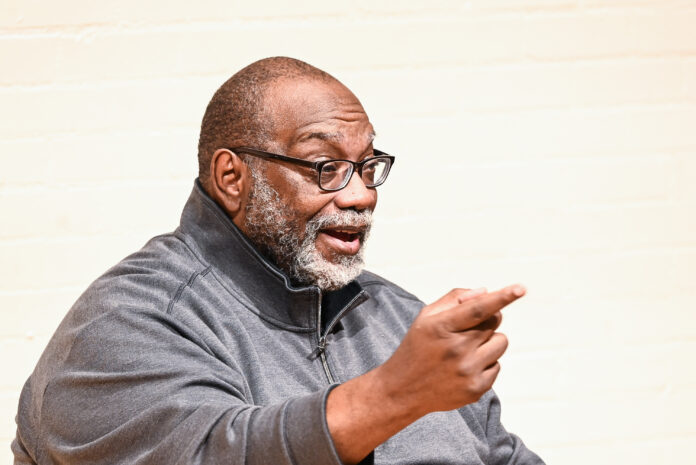
As part of their programming on Speculative Futures, the Center for Ethics held a lecture on Oct. 11, given by Fred Moten, Ph.D, titled “Notes on Dis place/meant.” Fred Moten is currently a professor at New York University Tisch School of the Arts, where his teachings focus on critical theory, Black studies and performance studies. He attended Harvard University and the University of California, Berkeley and has taught at multiple universities across the nation. He is a writer and poet, with his works concentrating on sound, voice and Black culture and experiences.
Moten’s lecture covered a variety of different subjects, though they were all intertwined by an overarching theme of sociology and its effect on Black voices. He began his talk by reading from one of his most recent works, where he described sociology as both “a saving grace” or a “genocidal tool” for Black people. Moten discussed how sociology is oftentimes used to give wrong reasoning to why there is urban unrest in Black communities, citing more matriarichal homes paired with broken family structures. This untrue sociological evidence leads to public policies being enacted, furthering false stereotypes about the Black community, turning sociology into this “genocidal tool” Moten makes a point of. He also calls to issue the topic of seeing and naming, as it is part of a fundamental structure of oppression. Seeing and naming everything possible can only turn into only focusing on what needs to be improved. This need for improvement often gets traced back to people who are struggling, and putting them at fault, further upholding a stigma against those who are poverty-stricken. Moten asks his audience, “Is there a way to reconfigure seeing and naming in this world?” He allows for his listeners to develop their own opinions, while eventually giving his own perspective. He believes that “if there is a way, it has to be a way that isn’t looking at, rather looking with, from seeing to, to seeing with,” signaling that much progress must be made in order for these human-made labels to become beneficial. Moten’s lecture left his audience with new understandings of the role that social science fields play in upholding biases against marginalized groups.
When asked about her thoughts on the lecture, Iris Jordan ‘26 stated, “I found it very interesting how he is a performance studies professor, but talked more about sociology than anything else. It’s very interesting as a prospective theatre major and sociology minor.” Julian Chapparo ‘26 has a similar outlook, stating that “it was interesting how he related physics and sociology, and that there’s an intersection between the two, which I had never considered before.” Moten’s lecture emphasized the importance of recognizing how multiple different fields can intersect and overlap, and share similarities. For instance, he discussed the theme of entanglement through the ideas of both Einstein and DuBois, in physics and sociology. These intersections into multiple fields resonated with many students at the event, as their fields of study were contextualized in Moten’s main themes.
“Is there a way to reconfigure seeing and naming in this world?… if there is a way, it has to be a way that isn’t looking at, rather looking with, from seeing to, to seeing with”
Fred Moten, Ph. D
Then, on the afternoon of Oct. 12, Moten held a writing workshop focused on listening to songs he found to be influential to “retro-speculation.” One of the songs played and discussed was “Little Ghetto Boy,” by Donny Hathaway. Moten talked about the importance of the song’s overarching theme of leaving home, and how in the 1960s and 1970s this was crucial to urban Black communities, as it was often encouraged to leave home and be successful elsewhere. Moten related this movement to his own life, as he recalled that he was sent to college as an opportunity to leave his current social situation, as well as to learn about what was wrong with it. He then contrasted this to plans of his current students, as many of them plan to move back to their hometowns and stay there after graduation. He attributes this to more comfortable and affirming social situations at home, all of which give a new understanding of what it means to finally go back home.
This movement of staying at home that Moten attests to progress in communities, ties into the Center for Ethics’ theme of Speculative Futures. When asked about the importance of the theme, Mark Stein, Ph.D., the Center’s director and professor of history, expressed that they “chose Speculative Futures because it seemed like a great idea that was helpful and forward looking.” More generally, Stein spoke on the goals of the Center by hosting events, such as Moten’s lecture. He stated that, “These sorts of events are important to the community for a number of reasons. They bring notable outside scholars and others to campus to share their ideas, work, and thoughts. These are great opportunities to engage with the ideas of the Center’s themes outside of the classroom.” Moten’s informative lecture and workshop undoubtedly helped the Center reach their goals, as it gave students an opportunity to learn about Black voices and sociology’s role in the external interpretation of others. He advised his student audience saying, “You, as college students, should be focusing on how to make the already existing structures work a little better, not focusing on how to dismantle these structures,” leaving the Muhlenberg community with direction on how they can make a worthwhile influence.
Amy Swartz ‘26 is an English & creative writing and political science double major. She is a General Editorial Assistant, and is thrilled to be a part of such an amazing organization! Outside of the Weekly, you can always find her reading a new book, updating her Spotify playlists, or rewatching an episode of New Girl!






















